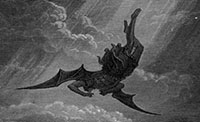Lúsífer
Úr latínu, sem merkir "ljósberi". Sá sem náði stöðu erkiengils og féll úr náð vegna drambs, ofmetnaðar og löngunar til að vera ofar stjörnum Guðs (sonum Guðs og Elóhíms), fyrir ofan dýrð Shekinah til að standa ofar hinum hæsta. „Hversu ertu hröpuð af himni, þú árborna morgunstjarna! ...“[1]


Frumgerð (erkitýpa) hins hnattræna jaðarbúa.
Fallnir englar
Jesaja 14:12–17 veitir ritningarlega frásögn af stríðsyfirlýsingu Lúsífers gegn almáttugum Guði og Kristi hans:
Nú ertu fallinn af himni, ljósberi, sonur morgunroðans. Nú ert þú að velli lagður, sigurvegari þjóðríkja!
Þú sagðir við sjálfan þig: „Ég skal stíga upp til himins, ofar stjörnum Guðs, þar skal ég reisa hásæti mitt. Á þingfjalli guðanna tek ég mér sæti, yst í norðri.
Ég skal stíga ofar hæstu skýjum, líkjast Hinum hæsta.“
En þér var varpað niður til heljar, í hina dýpstu gryfju.
Þeim sem líta þig verður starsýnt á þig, þeir virða þig vandlega fyrir sér: „Er þetta maðurinn sem skók alla jörðina, lét konungsríki riða?
Hann gerði jörðina að eyðimörk, reif niður borgir og sleppti föngum sínum ekki heim.“
Sanat Kumara talar um englana sem fylgdu Lúsifer í uppreisninni miklu:
In the Great Rebellion against the LORD God Almighty and the hosts of his heavenly Hierarchy, Lucifer seduced no small number of angelic bands led by his cohorts. Their names are mentioned in the Book of Enoch, and in other books of the Apocrypha, and in the codified scriptures of East and West.
More notable are the names Satan, Beelzebub, Belial, Baal, etc. One such name, that of the more shrewd and subtil leader of a band of fallen ones, has come to be lowercased in the lexicon of sacred scripture, and it has taken on a symbolic rather than personal connotation. It is that of Serpent.
Whereas the term “great dragon” refers to the conglomerate of the entire Luciferian false hierarchy arrayed against the Great White Brotherhood, its individual members and hierarchs specialize in certain phases of the “dragon’s” persecution of the Woman and in the war waged by the Luciferian false hierarchy against the remnant of the Woman’s seed.
Whereas Satan is known as the original Murderer using the murder of the lightbearers to thwart the divine plan of God in the earth, Serpent, who is also “called the Devil and Satan,” is the Archdeceiver, the original Liar and the father of lies whose philosophy of deception, based on fear and doubt, is his modus operandi in his warfare against the true Christs and the true prophets.
Serpent is the Wicked One whose seed, along with Satan’s, is sown as tares among the good wheat of the Christic seed. It is this seed who are called the offspring of the vipers. “Viper” is from the Greek translation of the proper name “Serpent,” who, together with the fallen ones of his band, was cast out of heaven and took embodiment on earth where they have continued to reincarnate since the Great Rebellion.[2]
The angels who followed this archdeceiver, named by Jesus “the father of lies” and “a murderer from the beginning,”[3] are the fallen ones, also called Luciferians, Satanists or sons of Belial (after their various lieutenants). More than disobedient, these rebels against First Cause were blasphemous and contemptuous of the Father and his children amongst whom they embodied (see the parable of the tares among the wheat, Matt. 13), having been brought low—to the lowly estate of physical incarnation—by the LORD’s hosts.
The final judgment of Lucifer
Lucifer was bound “on earth” by Michael the Archangel on April 16, 1975 (even as he and his angels had been bound “in heaven” by the same Defender of the Faith and his angels) and taken to the Court of the Sacred Fire on Sirius, where he stood trial before the Four and Twenty Elders over a period of ten days. The testimony of many souls of light in embodiment on Terra and other planets and systems were heard, together with that of the ascended masters, archangels, and Elohim.
On April 26, 1975, he was found guilty of total rebellion against Almighty God by the unanimous vote of the Twenty Four and sentenced to the second death. As he stood on the disc of the sacred fire before the court, the flame of Alpha and Omega rose as a spiral of intense white light, canceling out an identity and a consciousness that had influenced the fall of one third of the angels of the galaxies and countless lifewaves evolving in this and other systems of worlds.
Many who followed the Fallen One in the Great Rebellion against the Son of God have also been brought to trial. His seed, still “wroth with the Woman” and her Manchild, are making war with the heirs of Sanat Kumara’s light on planet earth.[4] Daily they are being bound by Archangel Michael and the Lord’s hosts and remanded to stand trial in the final judgment as one by one their time is up—and they are being judged: “every man according to their works,” as Jesus’ angel showed it in a vision of the last days of the Piscean age to John the Revelator.
See also
For more information
Elizabeth Clare Prophet, Fallen Angels and the Origins of Evil
See also Jesus’ parable of the tares and the wheat (Matt. 13:24–30, 36–43).
Sources
Mark L. Prophet and Elizabeth Clare Prophet, Saint Germain On Alchemy: Formulas for Self-Transformation.
Archangel Gabriel, Mysteries of the Holy Grail.
- ↑ Jes. 14:12.
- ↑ Elizabeth Clare Prophet, The Opening of the Seventh Seal: Sanat Kumara on the Path of the Ruby Ray, chapter 33.
- ↑ John 8:44.
- ↑ See Rev. 12.
